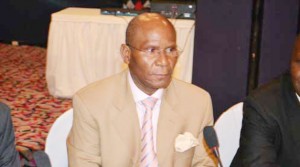By MAIMBOLWA MULIKELELA-
ZAMBIA has urged the Eastern and Southern Africa (ESA) member countries not to concede on critical issues pertaining to negotiations of the Economic Partnership Agreements (EPAs).
Commerce, Trade and Industry Minister Robert Sichinga said that it was important for ESA member countries not to relent as long as they were still in negotiations with EU on the EPAs.
This follows the decision by the European Union (EU) to suspend duty-free and quota-free market access by October 1, 2014 if the African, Caribbean and Pacific (ACP) group of states do not sign the EPAs.
Mr Sichinga said the decision by the EU to suspend duty-free and quota-free market access by October added more pressure to the African countries negotiating to come up with a definitive position before the stated deadline at the end of September 2014.
Speaking during the 19th ESA EPA Council of Ministers meeting in Lusaka yesterday, Mr Sichinga said for the last 10 years, ESA countries had reiterated their commitment to the EPAs’ process but progress had been limited.
Mr Sichinga, who is also ESA chairperson, said the EPAs’ negotiations needed to take into account the important national, regional and global developments that had taken place since the EPAs were launched 10 years ago.
“It is time we walk the talk by taking necessary actions towards concluding the negotiations or it is time we say these EPAs do not work,” Mr Sichinga said. “Such decisions need to be taken on the basis of scientific studies, hence I directed that these studies be undertaken.”
The Common Market for Eastern and Southern Africa (COMESA) and the United Nations Economic Commission for Africa (UNECA) commissioned a study to assess the EPA Impact on ESA member countries.
The impact assessment studies are designed to inform each country of the potential challenges, costs and benefits of either signing or not signing an EPA with the EU on the basis of the emerging texts or positions of the draft consolidated ESA-EU agreement.
“What seems clear in my understanding is that our historic trade and economic relations with Europe are being severely and increasingly tested, with both sides trying to adjust to this new situation,” the minister said.
Speaking at the same function, COMESA Secretary General Sindiso Ngwenya said it was important for the EPA to take into consideration the developmental programmes of member states.
Mr Ngwenya said industrialisation was key to the development of Africa, saying that it would help in the economic transformation.
He said Africa could not continue to export its materials in its raw form, hence the need for the EPA to factor in the issues of industrialisation and trade.







